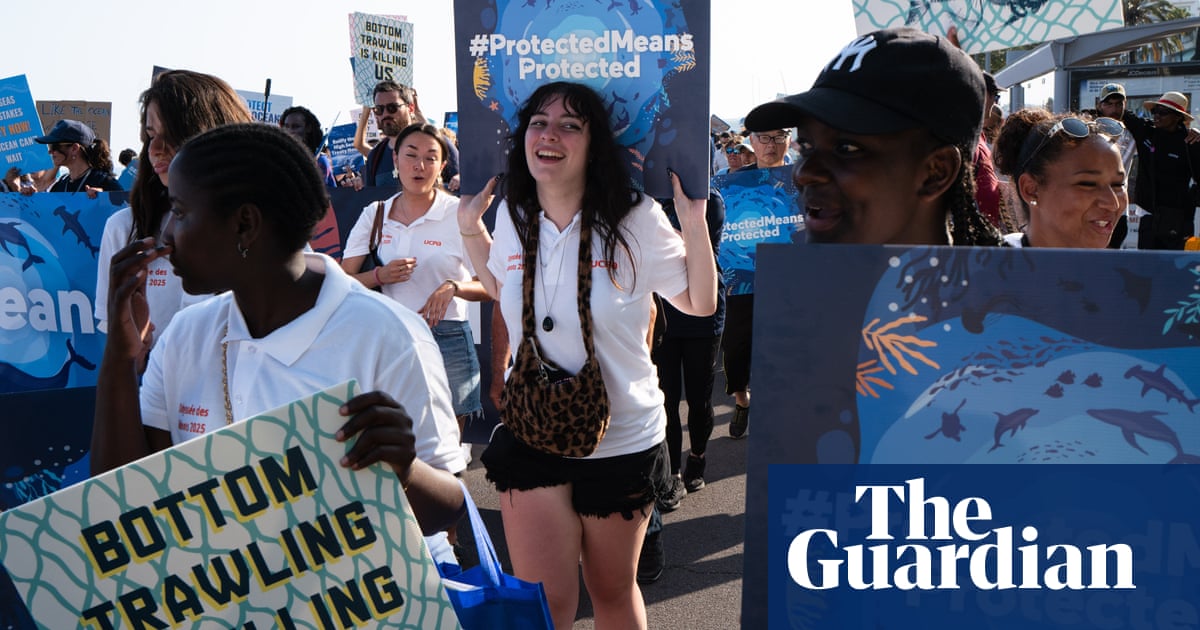Environmental groups have welcomed government proposals to ban the destructive fishing practice known as bottom trawling in half of England’s protected seas.
The plan, to be announced on Monday by the environment secretary, Steve Reed, came before a UN summit in Nice to tackle the ocean’s failing health. It follows pressure from conservationists and the release of a David Attenborough film featuring rare underwater footage of the devastation to the seabed caused by bottom trawling in British waters.
The practice involve vessels dragging weighted nets over vulnerable habitats, forcing fish, shellfish and unwanted bycatch into a vast trawl net.
The government’s proposals would ban the practice in 41 marine protected areas (MPAs), focusing on ecologically sensitive and vulnerable seabed habitats, covering 30,000 sq km of England’s seas. Together with existing bans, the proposal would bring the total area in which bottom trawling is banned to 48,000 sq km.
Reed, who will represent the UK at the UN Ocean Conference (UNOC), said the government was taking “decisive action” to protect England’s seas. “Bottom trawling is damaging our precious marine wildlife and habitats,” he said. “Without such action, our oceans would be irreversibly destroyed.”
Joan Edwards, the director of policy at theWildlifeTrusts, which has long campaigned for better management of MPAs, said: “Removing this pressure is a great step forward towards protecting not only the wildlife and fish stocks within those sites but also the carbon stored in the seabed muds beneath.”
She said she hoped after the government’s consultation on the proposals that the measures would apply rapidly in a “win-win” for nature and the climate.
Hugo Tagholm, the executive director of Oceana UK, said that if the bans were fully implemented it would provide “an invaluable and urgently needed lifeline for England’s seas”.
Oceana found that fishing vessels with bottom-towed gear were active in the UK’s offshore MPAs for 33,000 hours in 2023, adding up to four years.
Jonny Hughes, the senior policy manager at the Blue Marine Foundation, an ocean conservation charity, said: “Conservation policy is awash with shiny new announcements and impressive sounding targets whereas what is needed is actual delivery. This, at first glance seems to be about delivering conservation. We need to see the full details, but initial reading is positive.”
Sign up toDown to Earth
The planet's most important stories. Get all the week's environment news - the good, the bad and the essential
after newsletter promotion
The consultation, launched by the Marine Management Organisation with the Department for Environment, Food and Rural Affairs, will run for 12 weeks from 9 June.
Attenborough, who was interviewed by Prince William before the UN ocean conference, which opens on Monday, said he was appalled by the footage in his film, Ocean. “If you did anything like it on land, everyone would be up in arms,” he said.
The French president, Emmanuel Macron, who is co-hosting UNOC with Costa Rica, will be under pressure at the conference to commit to protecting more of French waters,against the wishes of the country’s fishing lobby. Macron’s office has said an important announcement would be made in Nice.
